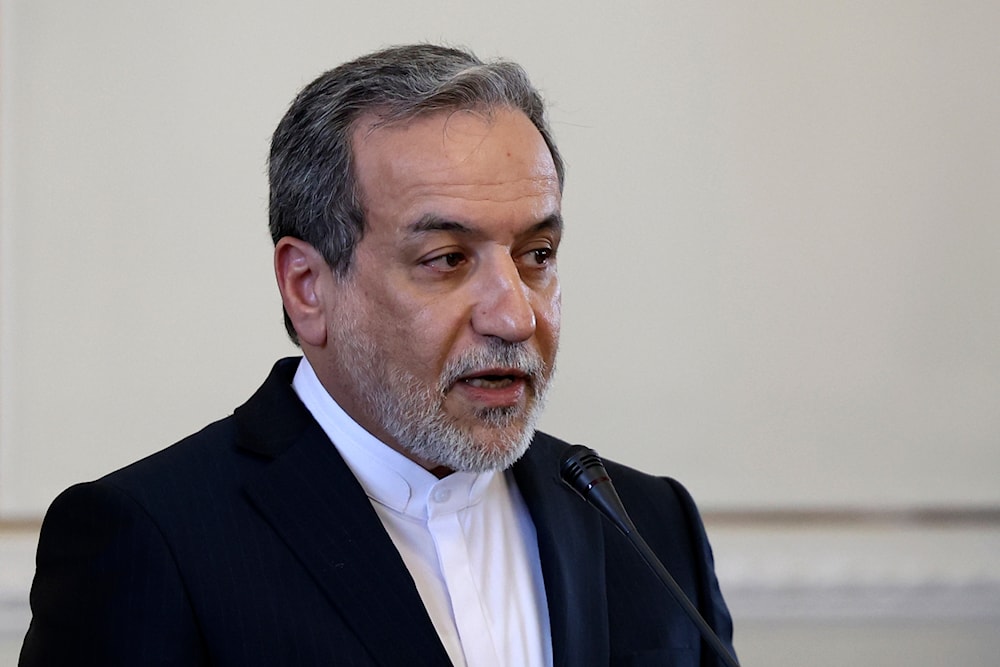Iran prioritizes its interests over Trump's expectations: FM Araghchi
Foreign Minister Abbas Araghchi stresses Iran’s focus on its interests and diplomacy, rejecting talks under pressure and prioritizing sanctions neutralization over negotiations.
-

Iranian Foreign Minister Abbas Araghchi speaks in a joint press conference with his Russian counterpart Sergey Lavrov, in Tehran, Iran, on February 25, 2025. (AP)
Iranian Foreign Minister Abbas Araghchi said that Iran makes decisions based on its interests, regardless of US President Donald Trump's expectations, reaffirming Tehran’s dedication to diplomacy.
In an interview with KhabarOnline published Sunday, Araghchi addressed Iran’s receipt of a letter from Trump via a UAE envoy.
When asked whether Trump would receive a written response, he stated, "We have nothing to do with his expectations. We act upon our own interests. What is best for us will be done."
He also underscored the significance of diplomacy, noting that while all countries prioritize diplomatic solutions, war can sometimes be unavoidable despite its risks and consequences, adding, "It can never be said that the path of diplomacy is over as the alternative to diplomacy is war."
He further emphasized that Iran has always avoided war, but stands ready for it and is not afraid of it.
"Therefore, the foreign policy of the Islamic Republic of Iran is definitely focused on diplomacy and avoiding war; except where war is inevitable, which has its own conditions."
More of a 'threat than an offer'
On Thursday, Araghchi said that a recent letter from Trump, calling for renewed nuclear talks, was "actually more of a threat" than an offer, adding that Tehran would issue a response soon.
Speaking to Iranian state television, he noted that while the letter appeared to present opportunities, its tone was ultimately threatening, stating that Iran was carefully reviewing its contents and would respond "in the coming days."
Earlier this month, Trump told Fox News that he had sent a letter to Sayyed Ali Khamenei, urging Iran to begin nuclear deal talks or face military action. In parallel, the US imposed new sanctions on Iran as part of Trump's "maximum pressure" policy.
However, Iran has stated that it will not engage in talks with the US under pressure or threats, and is currently considering its response to Trump's letter, which was seen as both a threat and an offer of potential opportunities.
In the interview, the foreign minister explained that Iran's refusal to negotiate with the US stems from historical experience, not stubbornness. He emphasized that Iran had previously used diplomacy to its fullest to lift the sanctions imposed on the country.
Iran entered the negotiations for the 2015 nuclear deal, known as the Joint Comprehensive Plan of Action, with good faith. "After the agreement, we adhered to all our commitments in good faith. Who betrayed diplomacy here? It was the US that abandoned all this and went back to another path. This has created some distrust," he said.
Araghchi stated that the JCPOA, in its current form, cannot be revived due to Iran's advanced nuclear situation and the imposition of new sanctions on the country, adding, "Therefore, it is not realistic to revive the JCPOA, but it can still serve as a basis and a model for negotiations."
He explained that Iran is focused on two key objectives: neutralizing sanctions and holding negotiations to lift them, emphasizing that bypassing and making the sanctions ineffective takes priority over the negotiation process.

 3 Min Read
3 Min Read








